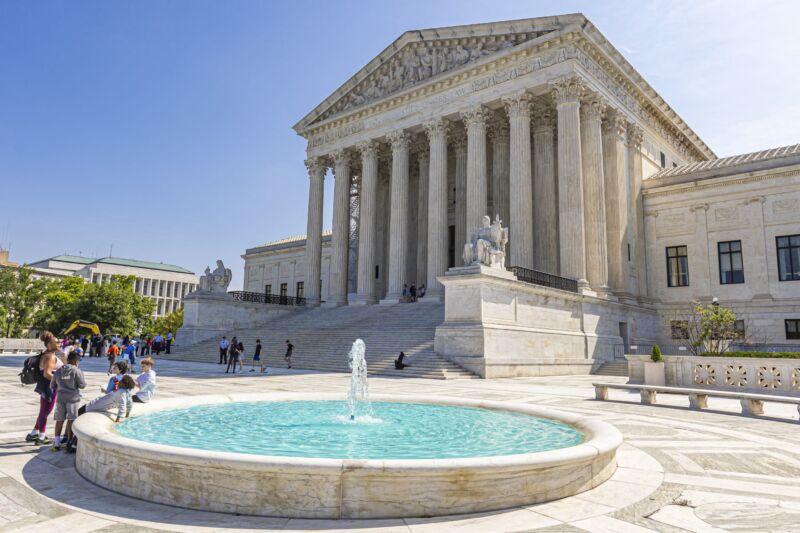
Enlarge / The Supreme Court of the United States in Washington, DC, in May 2023.
Getty Images | NurPhoto
The US Supreme Court has avoided making a final decision on challenges to the Texas and Florida social media laws, but the majority opinion written by Justice Elena Kagan criticized the Texas law and made it clear that content moderation is protected by the First Amendment.
The Texas law “is unlikely to withstand First Amendment scrutiny,” the Supreme Court majority wrote. “Texas has thus far justified the law as necessary to balance the mix of speech on Facebook’s News Feed and similar platforms; and the record reflects that Texas officials passed it because they thought those feeds skewed against politically conservative voices. But this Court has many times held, in many contexts, that it is no job for government to decide what counts as the right balance of private expression—to ‘un-bias’ what it thinks biased, rather than to leave such judgments to speakers and their audiences. That principle works for social-media platforms as it does for others.”
A Big Tech lobby group that challenged the state laws said it was pleased by the ruling. “In a complex series of opinions that were unanimous in the outcome, but divided 6-3 in their reasoning, the Court sent the cases back to lower courts, making clear that a State may not interfere with private actors’ speech,” the Computer & Communications Industry Association said.
Today’s Supreme Court ruling vacated decisions by two courts. The US Court of Appeals for the 5th Circuit previously upheld the Texas state law that prohibits large social media companies from moderating posts based on a user’s “viewpoint.” By contrast, the US Court of Appeals for the 11th Circuit blocked a Florida law that prohibits large social media sites from banning politicians and requires platforms to “apply censorship, deplatforming, and shadow banning standards in a consistent manner among its users on the platform.”
Lower courts failed to do full analysis
The Supreme Court said it remanded the cases to the appeals courts because the courts didn’t do a full analysis of the laws’ effects. “Today, we vacate both decisions for reasons separate from the First Amendment merits, because neither Court of Appeals properly considered the facial nature of [tech industry lobby group] NetChoice’s challenge,” the court majority wrote.
Justices found that the lower courts focused too much on the biggest platforms, like Facebook and YouTube, without considering the wider effects of the laws. The majority wrote:
The courts mainly addressed what the parties had focused on. And the parties mainly argued these cases as if the laws applied only to the curated feeds offered by the largest and most paradigmatic social-media platforms—as if, say, each case presented an as-applied challenge brought by Facebook protesting its loss of control over the content of its News Feed. But argument in this Court revealed that the laws might apply to, and differently affect, other kinds of websites and apps. In a facial challenge, that could well matter, even when the challenge is brought under the First Amendment.
The courts need to examine ways in which the laws might affect “how an email provider like Gmail filters incoming messages, how an online marketplace like Etsy displays customer reviews, how a payment service like Venmo manages friends’ financial exchanges, or how a ride-sharing service like Uber runs,” justices wrote.